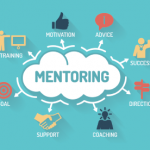 High-quality mentoring is perhaps the most recognized ingredient to a successful career, one that remains little understood. Here, we present a brief overview of the elements of successful mentor-mentee relationships for clinicians and scientists in rheumatology. We discuss the importance of mentorship and characteristics of good mentoring, and offer our personal reflections as both mentees and mentors.
High-quality mentoring is perhaps the most recognized ingredient to a successful career, one that remains little understood. Here, we present a brief overview of the elements of successful mentor-mentee relationships for clinicians and scientists in rheumatology. We discuss the importance of mentorship and characteristics of good mentoring, and offer our personal reflections as both mentees and mentors.
What Exactly Is a Mentor?
Mentor does not have a standardized definition. The term comes from Greek mythology. In Homer’s Odyssey, Mentor was a character in charge of Odysseus’ son Telemachus.1 However, Athena, Telemachus’ mother, disguised herself as Mentor, encouraging Telemachus to go abroad and giving him advice on how to deal with personal dilemmas.
Over time, the word mentor has come to mean someone who shares knowledge and gives wisdom to someone less experienced. Today, the term mentorship describes a two-way relationship in which one individual invests personal knowledge, energy and time to help another grow and develop to become the best and most successful they can be.2
Why Is Mentoring Important?
Successful mentorship fulfills several important roles. It serves as a critical bridge between didactic classroom instruction and the mastery of skills necessary to be an effective clinician and/or productive scientist. Without mentorship, the translation of high-level skills, along with the discernment to know when to apply such skills, can be lost.
Mentoring offers an opportunity to acquire tacit knowledge—unwritten information conveyed through interactions with colleagues, students and patients. Tacit knowledge allows us to view tasks and activities from multiple perspectives, work adroitly within complex health systems and communicate effectively within interprofessional teams.
Mentoring offers an opportunity to acquire tacit knowledge—unwritten information conveyed through interactions with colleagues, students & patients.
The personal growth and development that result from mentoring lead to increased academic productivity (e.g., papers and grants, career guidance and satisfaction) and the ability to network more effectively. Successful mentors encourage independent thinking and nurture the confidence mentees need to adopt new interests and methods that can propel them in new directions.
Opportunities
The most common model of mentorship is largely informal, in which mentees approach individuals they respect and trust to seek career guidance. Meetings may occur on an infrequent basis, and goals and outcomes of the informal mentor-mentee relationship are not formalized.
Informal mentorship is very common in medicine; for example, in 2016 only 50% of surgical departments in the U.S. reported offering formal mentorship programs.3 In rheumatology practice and research, most mentoring still occurs on an informal basis. This type of mentorship has inherent drawbacks, and the ultimate success of such partnerships has received little evaluation.
Within the rheumatology community, we are fortunate to have structured mentoring opportunities funding from the Rheumatology Research Foundation to nurture the development of future rheumatologists and rheumatology professionals interested in clinical practice and clinical research.
For short-term mentoring, the Foundation offers four-to-eight-week awards for preceptorships for medical and graduate students interested in exploring the field of rheumatology. These awards offer an opportunity for trainees to work closely with an ACR/ARP rheumatology mentor to learn about the field.
For longer-term opportunities, the Foundation offers a two-year Future Physician Scientist Award (for MD-PhD or DO-PhD candidates) and a three-year Scientist Development Award (for rheumatologists and rheumatology professionals) to pursue innovative research ideas.
Awards created by the ARP and administered through the Foundation are the Mentored Nurse Practitioner (NP) and Physician Assistant (PA) Awards for Workforce Expansion. These awards offer one-year mentorship arrangements between NP/PAs and an ACR member rheumatologist. Since its inception in 2019, 37 awardees across the U.S. and Virgin Islands have benefited from these mentorship awards.
Other opportunities for formal mentorships are available through the National Institutes of Health (NIH) in the form of K awards (e.g., K01, K12 and K23). Within institutions, T-32 grants may be available. Three-year mentoring awards are offered by the Childhood Arthritis and Rheumatology Research Alliance (CARRA) and the Arthritis Foundation for early career investigators in pediatric rheumatology.
Successful Partnerships
Successful mentorship, though desirable, often proves elusive. It demands an investment of time and resources, mutual respect and clear communication from both the mentor and mentee. It is helpful when both the mentor and mentee can acknowledge and share their interests, perspectives, mutual goals and preferences as part of the evaluation of overall fit.
Mentors
Mentors need to be patient while offering guidance, coaching and feedback. They need to have an altruistic spirit and exhibit a commitment to supporting the mentee’s personal and professional growth and intellectual independence. Optimal mentors are often described as generous, empathetic and selfless.4
Active listening is a key skill used by mentors to understand what is said, as well as left unsaid because mentees are sometimes reticent to express themselves. A good mentor is aware of the common concerns about competence and finding an appropriate work-life balance that all mentees harbor and actively creates a safe environment in which mentees feel able to take risks.
A high level of emotional intelligence is helpful for mentors to discern when to listen and when to gently ask about progress or give feedback in areas that may be challenging for the mentee. Mentors also must be able to help mentees recognize their strengths and weaknesses without judgment, and use this knowledge to help the mentee achieve their goals.
Resource
Although professional status is important, it is not the most important prerequisite of a mentor. Rather, many mentees chose their mentors based on mutual interests or compatibility rather than professional achievements.5
Mentors should be reasonably well established in their own careers to have the time and ability to help mentees develop as an emerging independent investigator or clinician in their specific field of interest.
Mentors should also be prepared to help mentees create other mentoring relationships with colleagues within and beyond their setting so mentees can gain additional expertise. The notion of a mentoring team is increasingly popular, with the recognition of the value of meaningful research that results from interprofessional collaborations.
Mentees
For mentees, a critical responsibility is to be proactive. It is the mentee’s responsibility to seek out and cultivate a working relationship with a potential mentor. For young clinicians, this could mean asking about how the mentor approaches specific patient populations, therapeutic treatments or techniques. For emerging scientists, this could mean preparing research questions around a specific topic or coming to meetings with data from analyses or drafts of manuscripts or abstracts.
Mentees should listen non-defensively to feedback and feel able to respond to what they have heard, either incorporating suggestions the mentor has provided or stating why certain suggestions may not have been taken.
From a broader perspective, the mentee should reflect on whether their overall goals are understood and say something if not. The mentee should feel comfortable to state when they don’t understand something or don’t agree with a proposed approach.
Coming Together
The first step in building a mentoring relationship is to clarify expectations with respect to time commitment, frequency of meetings, mentee needs and ground rules, such as preferred working styles of both individuals. Mentors will need to review issues and limits related to confidentiality.
Personal Reflections
Dan’s Story

Dr. White
My first mentee-mentor relationship was as a young physiotherapist doing clinical work. I wanted to get involved with research and learned of a senior clinician at the clinic where I was working who had an active research portfolio. I spoke with him about working on a research project. Although this was an informal mentorship, it had a major impact on my decision to become a clinician-scientist.
After publishing a paper with my mentor, I enrolled in a doctoral program to gain the skills and experience needed to become an independent investigator. As a doctoral student, I had the opportunity to receive formal mentoring from my faculty advisor. We would meet regularly to work on abstracts and papers. I would send new work in advance of the meeting, and my advisor would provide valuable feedback.
After finishing my Doctor of Science degree, I started a post-doctoral fellowship within a clinical epidemiology research unit. I was unique because most of my peers were physicians. Nevertheless, the training needs of both physicians and physical therapists aiming toward a career in clinical science were the same. I needed didactic training in epidemiology and specific mentorship in my areas of interest. For the first time, I had the opportunity to be mentored by several senior scientists, and each covered a specific area of development.
When I was at Boston University Medical Campus and Boston Medical Center, my overall career mentor, rheumatologist David Felson, MD, MPH, ensured I was moving in the right direction overall. I also had two content-specific mentors. One was rheumatologist Tuhina Neogi, MD, PhD, who provided mentorship from a clinical perspective, and the other was Yuqing Zhang, MD, a methodologist who stretched my understanding of how to apply epidemiologic methods. I was also heavily influenced by biostatistician Mike LaValley, PhD.
As my area of research became more focused, I reached out to experts within these specialized fields, which helped me gain a better understanding of scientific methods and approaches to physical activity.
After taking my first tenure-track appointment, I set up my own lab and started to mentor emerging clinician scientists. I applied what I felt worked best as a mentee, focusing on mentee-led projects that involved papers and abstracts, and set up a recurring meeting schedule to touch base with each mentee.
What has surprised me the most is how my mentees took some of my initial areas of interest and developed them into brilliant works that I could not have thought were possible.
To this day, being a mentor continues to be a very rewarding experience.
Susan’s Story

Dr. Bartlett
My most influential mentoring experiences in rheumatology were in my early days as an instructor of medicine at Johns Hopkins University, Baltimore. During grad school and a post-doctoral fellowship, I had implemented and evaluated the effects of weight management treatments on patient outcomes, including arthritis.
An opportunity arose to create a clinical research program with Joan Bathon, MD, in the newly formed Hopkins Arthritis Center in 1998. Although this presented incredible opportunities, I also found it somewhat daunting to be an applied psychologist and researcher within the School of Medicine at Johns Hopkins while surrounded almost exclusively by rheumatologists and basic scientists in immunology.
Dr. Bathon encouraged me to apply for a newly created NIH trainee award—the K23 Mentored Patient-Oriented Career Development Award. My project was titled The Impact of Weight Loss and Exercise on Knee Osteoarthritis, and it was one of the first K23 awards given to a non-physician. My multidisciplinary mentoring team included Dr. Bathon (rheumatology), David Levine, MD, ScD, MPH (participatory research), Scott Zeger, PhD, of the School of Public Health (biostatistics), and Cynthia Rand, PhD (psychology).
This five-year K23 award afforded me the opportunity to complete the Graduate Training Program in Clinical Investigation at the Johns Hopkins School of Public Health, and gain expertise and research experience in clinical epidemiology.
Together, the protected time, additional coursework and mentoring in rheumatology positioned me well for promotion to assistant professor at Hopkins Medicine in the Division of Rheumatology. This marked the start of a successful career as an independent researcher exploring how behavior change (weight loss, exercise, treatment adherence) and addressing mood can improve the lives of people with arthritis.
In gratitude for the mentoring I received, another mentee and I petitioned the Department of Medicine at Hopkins to create the David M. Levine Excellence in Mentoring Award to formally recognize the contributions of outstanding mentors. Created more than 20 years ago, this award rapidly became one of the most valued recognitions in the Hopkins community and beyond.
I remain passionate about, and actively involved with, creating opportunities for high-quality mentoring for trainees and early career professionals. Most recently, in spring 2022, I was a co-applicant, with ARP Immediate Past President Christine Stamatos, DNP, ANP-C, and current ARP President Barbara Slusher, MSW, PA-C, on an ACR/ARP proposal to expand and coordinate mentoring activities throughout the College. The hope is to expand access to mentorship bidirectionally for all members of the College.
Daniel K. White, PT, ScD, MSc, is an associate professor in the Department of Physical Therapy at the University of Delaware, Newark, and the director of the Delaware ACTIVE Lab. He has also been an active member of the ARP for the past 15 years.
Susan Bartlett, PhD, is a professor in the Department of Medicine, Division of Experimental Medicine, Clinical Epidemiology and Rheumatology, McGill University, Montreal, as well as senior scientist, McGill University Health Centre; senior scientist, Arthritis Research Canada; co-director of the PROMIS Canada Research Initiative; and a licensed clinical psychologist.
References
- Bremmer JN. A Brief History of the Study of Greek Mythology. A Companion to Greek Mythology. Ken Dowden, Niall Livingstone, eds. 2011. pp. 525–547.
- Flaherty J. Coaching: Evoking Excellence in Others (2nd edition). Development and Learning in Organizations: An International Journal. 2006;20(6). doi:10.1108/dlo.2006.08120fae.002
- Kibbe MR, Pellegrini CA, Townsend CM Jr, et al. Characterization of Mentorship Programs in Departments of Surgery in the United States. JAMA Surg. 2016 Oct 1;151(10):900–906.
- Cho CS, Ramanan RA, Feldman MD. Defining the ideal qualities of mentorship: A qualitative analysis of the characteristics of outstanding mentors. Am J Med. 2011 May;124(5):453–458.
- Garmel GM. Mentoring medical students in academic emergency medicine. Acad Emerg Med. 2004 Dec;11(12):1351–1357.
- Henry-Noel N, Bishop M, Gwede CK, et al. Mentorship in Medicine and Other Health Professions. J Cancer Educ. 2019 Aug;34(4):629–637.



